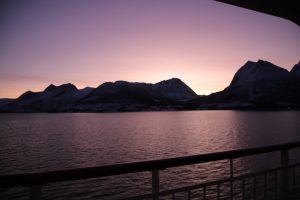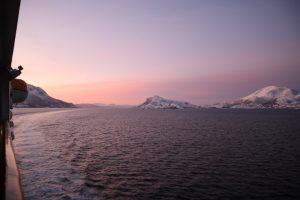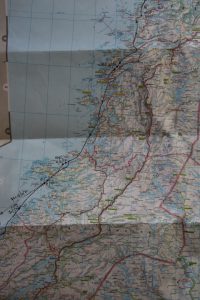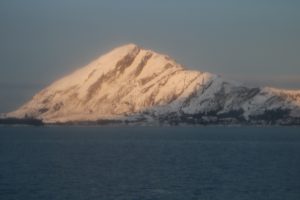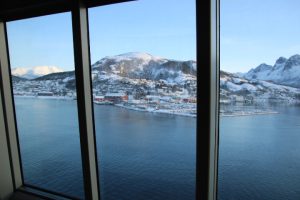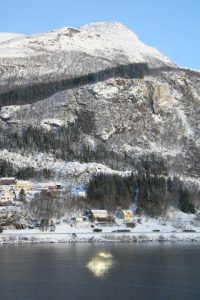Early this morning was the first time we experienced bright and clear light on the voyage. This light can play tricks on the eyes according to the Inuit and today there was a snow covered peak on the horizon which just looked like an iceberg.
At 08:30 it was 0ºC and was expected to rise to 1.0º on a flat sea, though we had a breeze from the east which certainly took the edge off the temperature. At 08:50 we crossed the Arctic Circle marked by a metal globe on a tiny island and 2 long blasts on the ships horn.
Beyond 66.3ºN we are in the high Arctic but here it is ice free because of the North Atlantic’s Drifts warm waters that prevent the accumulation of ice and introduce air temperatures many degrees warmer than other places on a similar line of latitude. Today we are approaching Tromsø at 69ºN and here the actual maximum temperature was -4ºC and a minimum of -8º. But at Inuvik, Northern Canada, at 68ºN the maximum was -17ºC and a minimum of -23ºC and at the same time Nome, Alaska at 64ºN was 2ºC maximum and -12ºC minimum. Tromsø and Nome are on the coast and at roughly the same latitude, but the former receives the North Atlantic Drift and the latter a cold current travelling south from the Arctic. Inuvik, however, is coastal and washed by the Arctic Ocean but so far from any ice free seas to reap any benefit from their warmth. This is known as continentality.
We are sailing through the fjords which are ice carved valleys, generally of a U-shape that have since been flooded by the sea at the end of the last Ice Age. The sea level is thought to have risen by about 100m hence the mountains appear to come straight out of the sea. As a man we met in the lift said, “this is unbelievable and it’s like sailing through the Alps”.
There is often a narrow ‘beach-like’ area called the strandflat at the water’s edge that can be cultivated especially where there are drumlins – egg shaped mounds of glacial clay and till. At the time of writing we are making good progress towards Tromsø though we are not on the original schedule due to the bad weather.
